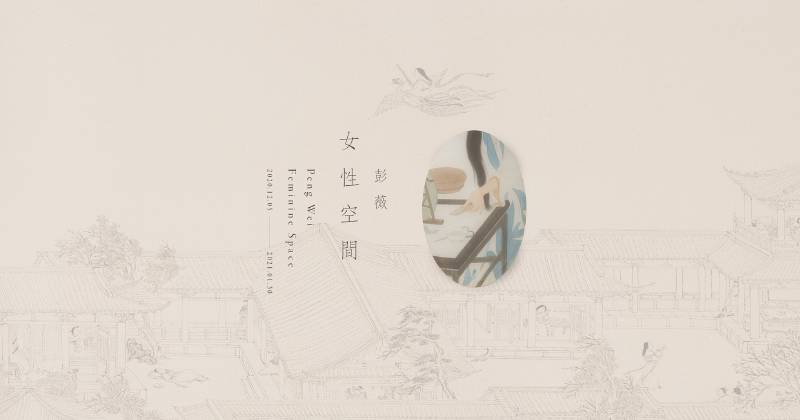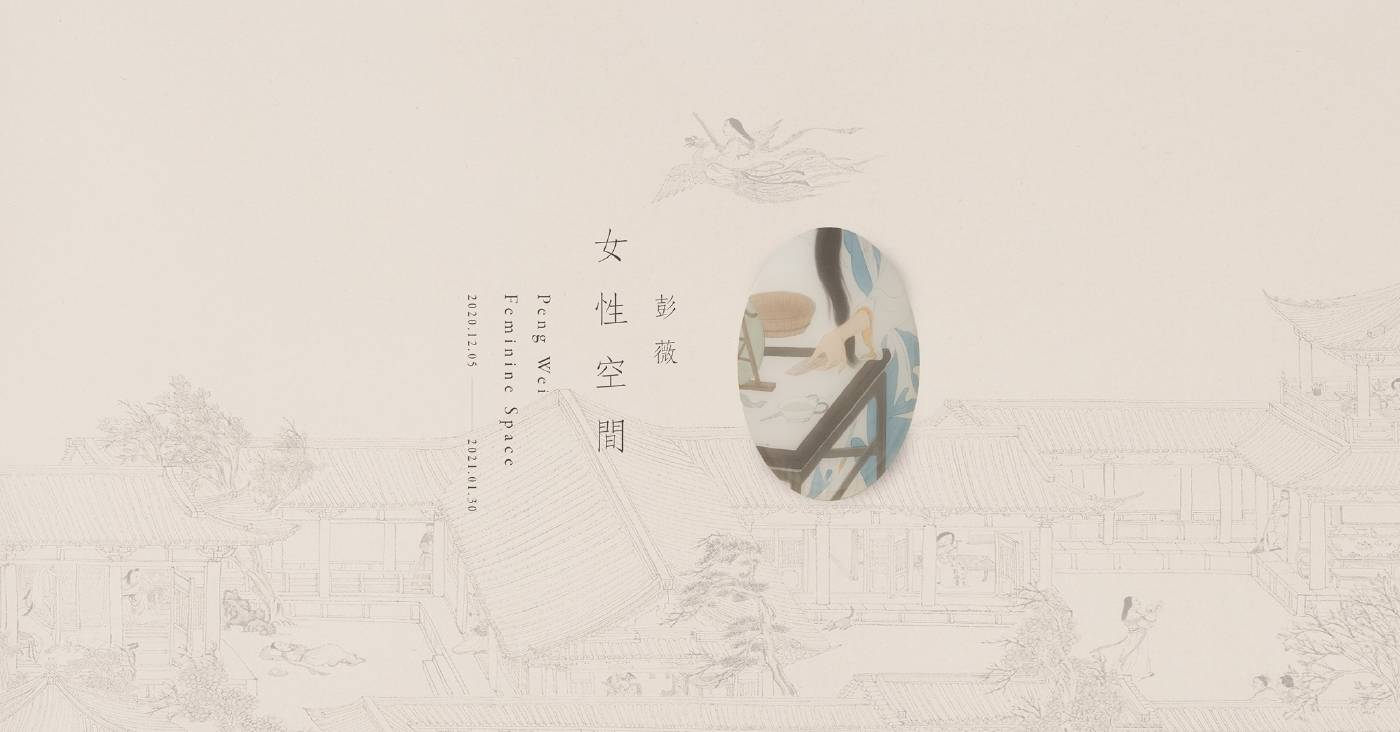耿畫廊
【彭薇女性空間】

-
展期
日期:2020-12-05 ~ 2021-01-30
-
地點
台北市11492內湖區瑞光路548巷15號1樓
-
參展藝術家
彭薇
-
(Please scroll down for English version)
開幕 │ 2020.12.05 (六) 下午4:30
彭薇作為中國代表性的當代藝術創作者,過往的作品從描繪山石,以東方材料繪製西方面孔,一直到圖鑑式的鞋履衣袈,總帶給觀眾不少驚奇。藉由筆韻墨色滲入紙麻棉絹纖維的表達,似乎在當代語彙之外,亦緊緊連結著千百年來雋永深刻的傳統精神。其中更不乏藝術家對自身文化的審視與思考,透過中國傳統文本的閱讀,近幾年的思考更多圍繞著「女性」展開,並與自身性別、文化相互辯證。
彭薇觀察到在不同文本之中,女性形象帶給她的陌生感受,強烈衝擊著她對女性的認知。夾帶著驚詫、不解、困惑,無論是呂坤《閨範》一書中對於女性楷模的描寫,或是來自相異經典中的女鬼(或具女性形象之精怪)。彭薇以自身女性的角度,凝視著、審視著這些「女性」形象所堆疊而成的團塊,彷彿這些形象之間並無所謂差異,僅是為了表達男性觀點、價值觀所產生的產物,她們甚至可以沒有名字般地被重複製造。彭薇將這些形象,從原來的故事中獨立而出,成為「再敘事」的介面。在脫離原本故事的情況下,這些女性的姿態與身體所帶來的陌生感受,同時也被放大了數倍。甚至這些女性的身體已足夠成為事件,或開展新的敘事。而所謂的「女性空間」便是透過女性與女性之間的差異、誤用、空缺,所產生的縫隙,經藝術家察覺後將這細微的縫隙撐開,藉由再敘事或將性別事件化,開闢獨一無二的敘事空間。
總長達五十米的《故事新編》將呂坤《閨範》一書中表達女德的形象,使用大尺幅的寫意筆法,在去除背景與情節的狀況下,將她們的姿態躍於紙上,使其身體作為觀看的焦點;《夢中人》系列作品,則取材自中國傳統故事中的女鬼形象。在失去前後文的狀況下,畫面的重點轉為幽靈的現形──女性的現形成為事件自身,透過西方作家的書信與圖像的並置,重新對迭失資訊的身體補充內容。彭薇試著藉由《七個夜晚》提出一種可能性:將自身陌化的同時又保持著一定的主動性,如萬花筒般在兩個自己間無限鏡射,凹折出錯接、併容大量敘事可能的世界。《七個夜晚》作品共分為七組,每一組除了描繪如夢境般的院落中發生的故事,歪斜縮放的畫作外框,除了回應畫作中的建築院落外,亦形成某種三維錯視,彷若跟著不可見的建築外牆凹曲透視;《窺》的系列,則由《七個夜晚》再次擷取了局部進行發揮:將空間中的敘事集合進行挑選,獨立出來表達;《Hi-Ne-Ni》、《這就是她》,分別由女體紙模與無內容的歐洲小框自極端的兩處出發。《Hi-Ne-Ni》女性的身體不僅是事件自身,亦是敘事發生的空間,《這就是她》則著迷於典雅的鏡框,鏡框自身的個性各異其趣,中間缺漏的空間似乎等待著一張特別的畫作:這些特別的畫作,各自差異,標示了女性空間的感性。
在彭薇此次個展中,觀眾看到的將不只是藝術家對水墨圖象的運用,更看見藝術家如何思考女性。與此同時,藝術家對女性的思辨,以及相異題材中女性的關注、表達,也強化了女性的視角。這視角並非單純的遙望、瀏覽,而是挾帶著強烈意志之凝視,彷若要將書本看穿,將畫筆刺進紙絹的皮下組織直達髓骨。在這樣的凝視中(女性的凝視),除了將敘事的主導權重掌於女性,也提示在現今世界中「女性美學」的另一種想像。
---
Peng Wei: Feminine Space
Exhibition Dates │ 12.05.2020–01.30.2021
Reception │ 12.05.2020 (Sat.) 4:30 p.m.
Venue │ Tina Keng Gallery (B1, No. 15, Ln. 548, Ruiguang Rd., Neihu Dist., Taipei, Taiwan 11492)
One of the prominent contemporary artists in China, Peng Wei is known for her paintings of landscapes and Taihu rocks, of Western faces rendered in Asian mediums, of delicate embroidered shoes and robes. Through her meticulous brushwork and application of ink across flax paper, cotton paper, or silk, an abiding spirit of centuries-long tradition enlaces her contemporary interpretation. The artist examines Chinese culture through a rigorous scrutiny of literati imagery that has in recent years gravitated toward femininity in a dialectical approach to gender and culture.
The image of the female in different ancient Chinese narratives elicits a foreign feeling in Peng Wei that disaccords with her idea of women. Stunned, confused, and bewildered, she finds the portrayal of the female — whether the exemplars in Paragons of Feminine Virtue by Ming-dynasty thinker Lv Kun, or the fox spirits and female ghosts in Strange Tales from the Chinese Studio by Qing-dynasty novelist Pu Songling — to be indistinguishable products of the male gaze that could be anonymously reproduced to reinforce patriarchal values. Peng Wei isolates these images from their original contexts, and transforms them into new narratives where the posture and the body of these women educes a strange feeling that becomes tacitly amplified. The body of these women reemerges as a new tale, or a spectacle in and of itself. The dissimilitude, misappropriation, and vacancy among these images of women create interstices which the artist adroitly leverages into a singular, feminine space by recontexualizing the parables or spectacularizing gender.
The 50-meter-long Old Tales Retold (2019) decontextualizes the exemplars from Ming-dynasty thinker Lv Kun’s Paragons of Feminine Virtue through freehand brushwork that brings these women to life, highlighting the female body. “The One in My Dreams” series (2020) is inspired by female ghosts from Chinese folklore. Disengaged from the original context, the painting is centered on the manifestation of the ghostly spirit — the female apparition turns into a spectacle. The juxtaposition of the imagery and Western authors’ letters embodies the artist’s attempt to recontextualize the disoriented persona.
By simultaneously distancing herself and retaining her agency, the artist conjures a kaleidoscopic microcosm of narrative possibilities in the “Seven Nights” series. The series consists of seven sets, each a portrayal of a courtyard and the events that went on therein which she once saw in her dreams. The skewed and scaled contours of the painting not only echo the architecture in the courtyard, but also evoke a three-dimensional illusion that allows the viewer to see past the invisible façade of the buildings. Inspired by “Seven Nights,” the “Peek” series attests the artist’s scrutiny of details, where carefully selected narratives are ingeniously magnified.
The “Hi-Ne-Ni” and “This Is Her” series represent two ends on Peng Wei’s artistic spectrum. The former comprises paper-plastered female mannequin busts, the latter a constellation of small paintings in European antique mirror frames. The female body in “Hi-Ne-Ni” morphs into a spectacle as much as an eventful space where inscrutable tales unfold, while “This Is Her” exudes a charm that permeates each delicate mirror frame — once vacant, awaiting a special painting: Peng Wei fills these frames with unique works that navigate feminine sensibility.
Feminine Space serves as a chance for the viewer to see not merely the artist’s sophisticated application of ink, but also her perspective on femininity. Peng Wei’s contemplation on what it means to be female, as well as her depiction of women rendered in varying mediums also privileges the female vantage point. Her stance is less an insouciant look from afar than an earnest gaze that pierces through the ancient works of Chinese literature, as she wields her paintbrush adamantly across the paper. This feminine gaze ultimately returns the prerogative of narrative to women, at the same time, hinting at another way to reimagine feminine aesthetics in contemporary society.
推薦展覽
view all耿畫廊
【深邃微妙—紀嘉華個展】Jason Chi Solo Exhibition: Perplexity
日期:2024-11-23 ~ 2025-01-18|台灣,台北市
34 days left宛儒畫廊
【地衣 - 黃碧惠當代水墨創作展】Lichen - Pi-Hui Huang Contemporary Ink Painting Exhibition
日期:2024-11-10 ~ 2024-12-31|台灣,台北市
16 days left
